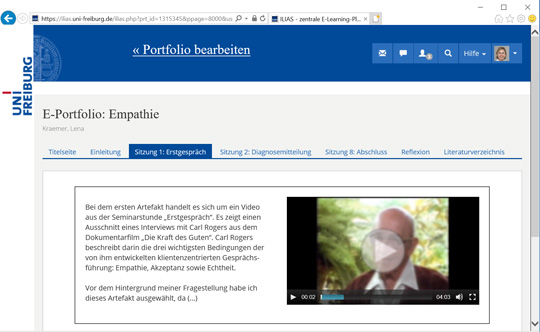Following Individual Learning Threads
Freiburg, Aug 14, 2018
The participants in a seminar taught by Lena Krämer from the Institute of Psychology address a personal question and collect suitable materials on it in e-portfolios. The point is not to just acquire knowledge but also learn to integrate and reflect critically on it. The course has already received the E-Learning Prize, which recognizes innovative teaching concepts.
 How can therapists express empathy? Psychology students address this question in a newly designed seminar in which they create e-portfolios to integrate and reflect critically on their knowledge.
How can therapists express empathy? Psychology students address this question in a newly designed seminar in which they create e-portfolios to integrate and reflect critically on their knowledge.
Photos: New Africa/Fotolia
Having students retrieve knowledge in exams or practice their research skills in seminar papers is not always enough for Dr. Lena Krämer from the University of Freiburg’s Institute of Psychology: “Sometimes the learning goal is not to acquire knowledge or competencies but to reflect.” That’s why she teaches her students how to analyze discussions in various therapy situations. By the end of the semester, her students should not merely be able to describe the right behavior in an initial interview, in difficult therapy situations, or at the conclusion of a therapy: “What is important is their ability to reflect profoundly on it all and grasp it at a deeper level,” explains Krämer.
The seminar used to conclude with a written exam. The students had to choose and provide a one-page answer to three of eleven questions. “But I was dissatisfied with it,” says Krämer, “because it did not test what I wanted to teach the students.” When she started teaching the seminar, her idea was thus to test not just the knowledge the students had acquired but also their ability to reflect on it. “There’s a key concept in higher education theory called constructive alignment: It states that there should be agreement between the learning goal, the learning activity, and that which one ultimately tests. In my seminar, the students should not just acquire knowledge but also integrate and reflect critically on their knowledge,” she explains. To test this new learning goal, Krämer has the participants in her seminar create e-portfolios. In 2017, the University of Freiburg awarded the psychologist its annual E-Learning Prize, which recognizes innovative concepts in the field of teaching.
 Video, audio recordings, PowerPoint slides: In the e-portfolios, the students explain from a first-person perspective which materials provided them with important insights.
Video, audio recordings, PowerPoint slides: In the e-portfolios, the students explain from a first-person perspective which materials provided them with important insights.
Photo: University of Freiburg
Portfolios are collections of coursework that can take on a variety of forms: The required structure can differ depending on the objective of the seminar, and they are often not graded. Krämer, however, does grade the portfolios created in her seminar at the end of the semester. The students are supposed to describe a process in them – in this case their own learning process: They document and discuss in writing what they have experienced in the course and describe their learning gains with reference to a self-chosen question. The portfolios are realized in the form of e-portfolios on the University of Freiburg’s online platform ILIAS.
A Modern Portfolio: Texts, Diagrams, Audio- and Video Files
“I had to familiarize myself with the topic myself at the start,” admits Krämer, who had never dealt with e-portfolios before. To do so, she took continuing education seminars at the university’s IT Services Department: “I pretty much jumped in at the deep end. A lot of time went into preparing the concept. The support I received from the University of Freiburg’s higher education teaching and learning team was invaluable.” The special thing about Krämer’s concept is that the teacher does not assign the topic herself but has the students develop it on their own. “The portfolio is a document for answering a self-chosen question by and for reflecting on what has been learned,” the psychologist explains. In the course of the seminar, the course participants work out a topic that they found particularly interesting in the context of the seminar and formulate an individual question on it. For example, one student asked herself how therapists can express empathy.
The students should be able to answer their question by the end of the seminar. By that time they have learned about various therapeutic discussion situations. The appropriate way to communicate empathy was thus a question that ran like a thread through the entire seminar for the student. In the course of the semester she collected all materials on the topic that were important for her learning process and was able to add to her personal collection any time in her own portfolio environment on ILIAS. Texts of all kind, class notes, PowerPoint slides, diagrams, or images can be uploaded to the platform. “On an electronic portfolio, you can also add YouTube links or audio or video recordings. That’s what makes an e-portfolio so exciting,” says Krämer. When the students simulate the first interview with a patient in a role-play, for instance, they can record their own learning experience with their mobile phones in order to reflect on it later on.
At the end of the seminar, the course participants reflect on the personal question they asked at the beginning of the seminar – taking into account the materials they collected in their portfolio. The students describe three of them in detail and put them in context with one another: They must be central to their question and at the same have made a relevant contribution to their learning process. The participants explain from a first-person perspective which materials have provided them with important insights. For example, one student chose an audio recording of a role-play from the seminar that she used to analyze verbal communication of empathy. A YouTube video of a therapy situation contributed to her understanding of nonverbal communication. A particular PowerPoint slide helped her to understand how to express empathy through silence. “I evaluate reflection in a portfolio at very different points,” explains Krämer: “How well did the students manage to develop a question from the seminar? How well can they analyze something with reference to an individual element of their portfolio? How well can they summarize it and consider it broadly and from different angles?”
A Good Instrument for Structuring Seminars
Since the students have a lot of reservations coming into the course, the Freiburg psychologist takes time for a good introduction and explains at the outset exactly how she will evaluate the portfolios. “The e-portfolio is something new and perhaps also frightening for many students,” she explains. Most of them have never worked with a tool of this kind and don’t know what to expect: “Confronting your own learning process also means confronting your own weaknesses, or rather your capacity for development.” An unsuccessful role-play, for example, can help students to realize that they should have behaved differently in a certain situation. “Many students remain skeptical until the end of the seminar – but afterwards I receive a lot of positive feedback on this assessment strategy, which forces students to consider what they learned in a course,” reports Krämer. She also found the approach convincing herself: “The e-portfolio is a good instrument for strengthening the structure of a course.” The fact that each student follows his or her own individual thread adds an exciting and dynamic element. The students grapple with the course content much more intensively and think about how the individual class sessions are connected to each other. They do more to prepare for class and put more thought into what they can contribute: “The highlight was an improvisational theater performance on couples therapy: The audience decided what the therapist should do next,” remembers Krämer. She has already used the prize money to further refine the concept and has recorded video tutorials to introduce teachers and students to the method. The tutorials are now freely available on ILIAS – a first step toward passing the idea on to other fields of study at the University of Freiburg.
Sarah Schwarzkopf

